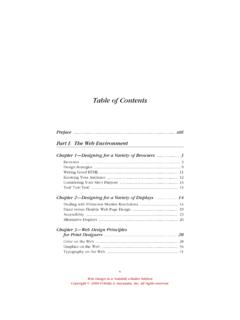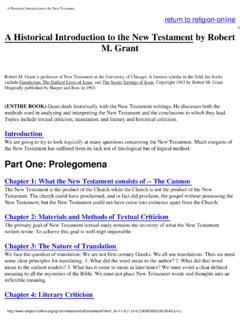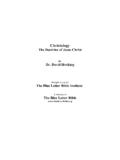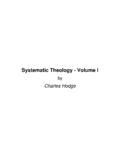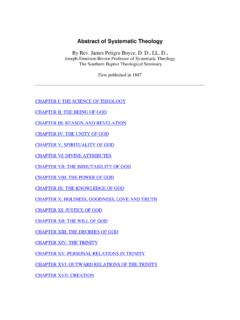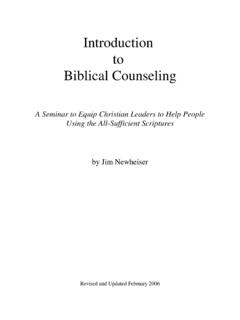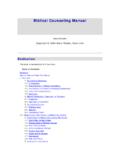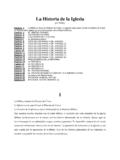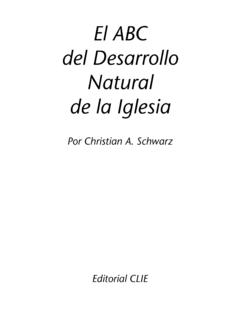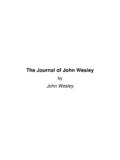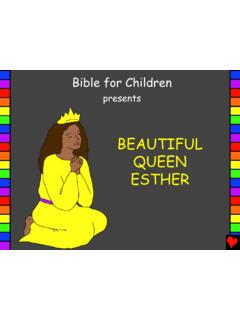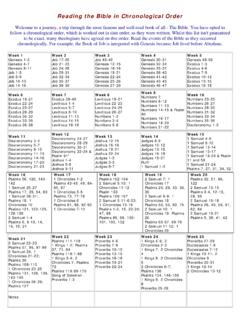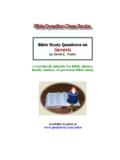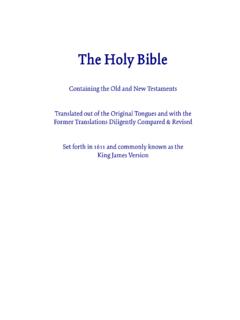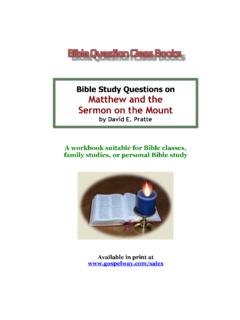Transcription of Smith's Bible Dictionary - NTSLibrary
1 Smith's Bible DictionarybyWilliam SmithAbout Smith's Bible DictionarySmith's Bible DictionaryTitle: :Smith, WilliamAuthor(s):Grand Rapids, MI: Christian Classics Ethereal LibraryPublisher:1884 Print Basis:Public DomainRights:2002-10-30 Date Created:All; Dictionary ; ReferenceCCEL Subjects:BS440 .S6LC Call no:The BibleLC Subjects:Works about the BibleTable of Contentsp. iiAbout This Book..p. 1 Title Page..p. 2 Smith's Bible Dictionary ..p. 2A..p. 77B..p. 114C..p. 148D..p. 170E..p. 207F..p. 218G..p. 246H..p. 290I..p. 305J..p. 368K..p. 378L..p. 409M..p. 475N..p. 509O..p. 524P..p. 604Q..p. 605R..p. 630S..p. 723T..p. 776U..p.
2 784V..p. 793W..p. 810Y..p. 811Z..p. 833 Indexes..p. 833 Index of Scripture References..iiiWilliam SmithSmith's Bible DictionaryivWilliam SmithSmith's Bible DictionarySmith s Bible DictionaryWilliam Smith1884 William SmithSmith's Bible DictionaryASee AlphaAarat(high or holy ground), a mountainous district of Asia mentioned in the Bible in connection withthe following events: (1) As the resting-place of the ark after the deluge. (Genesis 8:4) (2) Asthe asylum of the sons of Sennacherib. (2 Kings 19:37; Isaiah 37:38) Authorized Version has theland of Armenia. (3) As the ally, and probably the neighbor, of Minni and Ashchenaz.
3 (Jeremiah51:27) [Armenia] The name Ararat was unknown to the geographers of Greece and Rome, as itstill is to the Armenians of the present day; but it was an ancient name for a portion of its biblical sense it is descriptive generally of the Armenian highlands the lofty plateau whichover looks the plain of the Araxes on the north and of Mesopotomia on the south. Various opinionshave been put forth as to the spot where the ark rested, as described in (Genesis 8:4) (but it isprobable that it rested on some of the lower portions of the range than on the lofty peak to whichexclusively) Europeans have given the name Ararat, the mountain which is called Massis by theArmenians, Agri-Dagh, Steep Mountain, by the Turks, and Kuh-i-Nuh, Noah s Mountain,by the Persians.
4 It rises immediately out of the plain of the Araxes, and terminates in two conicalpeaks, named the Great and Less Ararat, about seven miles distant from each other; the former ofwhich attain an elevation of 17,260 feet above the level of the sea and about 14,000 above the plainof the Araxes, while the latter is lower by 4000 feet. The summit of the higher is covered witheternal snow for about 3000 feet. Arguri, the only village known to have been built on its slopes,was the spot where, according to tradition, Noah planted his vineyard. The mountains of Ararat are co-extensive with the Armenian plateau from the base of Ararat in the north to the range ofKurdistan in the south, we notice the following characteristics of that region as illustrating the Biblenarrative; (1) its elevation.
5 It rises to a height of from 6000 to 7000 feet above the level of the sea.(2) Its geographical position . Viewed with reference to the dispersion of the nations, Armenia isthe true centre of the world; and at the present day Ararat is the great boundary-stone between theempires of Russia, Turkey and Persia. (3) Its physical character . The plains as well as the mountainssupply evidence of volcanic agency. (4) The climate . Winter lasts from October to May, and issucceeded by a brief spring and a summer of intense heat. (5) The vegetation . Grass growsluxuriantly on the plateau, and furnishes abundant pasture during the summer months to the flocksof the nomad Kurds.
6 Wheat, barley and vines ripen at far higher altitudes than on the Alps and (a teacher, or lofty), the son of Amram and Jochebed, and the older brother of Moses andMiriam. (Numbers 26:59; 33:39) ( 1573.) He was a Levite, and is first mentioned in (Exodus4:14) He was appointed by Jehovah to be the interpreter, (Exodus 4:16) of his brother Moses, whowas slow of speech; and accordingly he was not only the organ of communication with theIsraelites and with Pharaoh, (Exodus 4:30; 7:2) but also the actual instrument of working most ofthe miracles of the Exodus. (Exodus 7:19) etc. On the way to Mount Sinai, during the battle withAmalek, Aaron with Hur stayed up the weary hands of Moses when they were lifted up for thevictory of Israel.
7 (Exodus 17:9) He is mentioned as dependent upon his brother and deriving all hisauthority from him. Left, on Moses departure into Sinai, to guide the people, Aaron is tried for amoment on his own responsibility, and he fails from a weak inability to withstand the demand ofthe people for visible gods to go before them, by making an image of Jehovah, in the well-known2 William SmithSmith's Bible Dictionaryform of Egyptian idolatry (Apis or Mnevis). He repented of his sin, and Moses gained forgivenessfor him. (9:20) Aaron was not consecrated by Moses to the new office of the high priesthood.(Exodus 29:9) From this time the history of Aaron is almost entirely that of the priesthood, and itschief feature is the great rebellion of Korah and the Levites.
8 Leaning, as he seems to have done,wholly on Moses, it is not strange that he should have shared his sin at Meribah and its Moses. (Numbers 20:10-12) Aaron s death seems to have followed very speedily. It took placeon Mount Hor, after the transference of his robes and office to Eleazar. (Numbers 20:28) Thismount is still called the Mountain of Aaron. See Hor. The wife of Aaron was Elisheba, (Exodus6:23) and the two sons who survived him, Eleazar and Ithamar. The high priesthood descended tothe former, and to his descendants until the time of Eli, who, although of the house of Ithamar,received the high priesthood and transmitted it to his children; with them it continued till theaccession of Solomon, who took it from Abiathar and restored it to Zadok (of the house of Eleazar).
9 See (1 Chronicles 12:27) priests of the family of Month.(father), an element in the composition of many proper names, of which Abba is a Chaldaicform, having the sense of endowed with, possessed of. AbaddonSee (God-given), one of the seven eunuchs in the Persian court of Ahasuerus. ( esther 1:10)Abana(perennial, stony), one of the rivers of Damascus. (2 Kings 5:12) The Barada and the Awajare now the chief streams of Damascus, the former representing the Abana and the latter the Pharparof the text. The Barada (Abana) rises in the Antilibanus, at about 23 miles from the city, afterflowing through which it runs across the plain, of whose fertility it is the chief source, till it losesitself in the lake or marsh (regions beyond), a mountain or range of highlands on the east of the Jordan, in the land ofMoab, facing Jericho, and forming the eastern wall of the Jordan valley at that part.
10 Its most elevatedspot was the Mount Nebo, head of the Pisgah, from which Moses viewed the Promised Landbefore his death. These mountains are mentioned in (Numbers 27:12; 33:47,48) and Deuteronomy32:49 AbbaSee of Adoniram. (1 Kings 4:6) Son of Shammua, (Nehemiah 11:17) called Obadiah in (1 Chronicles 9:16)Abdeelfather of Shelemiah. (Jeremiah 36:26)Abdi(my servant).3 William SmithSmith's Bible Dictionary A Merarite, and ancestor of Ethan the singer. (1 Chronicles 6:44) ( before 1015.) The father of Kish, a Merarite, in the reign of Hezekiah. (2 Chronicles 29:12) ( before 736.) One of the Bene-Elam in the time of Ezra, who had married a foreign wife.
